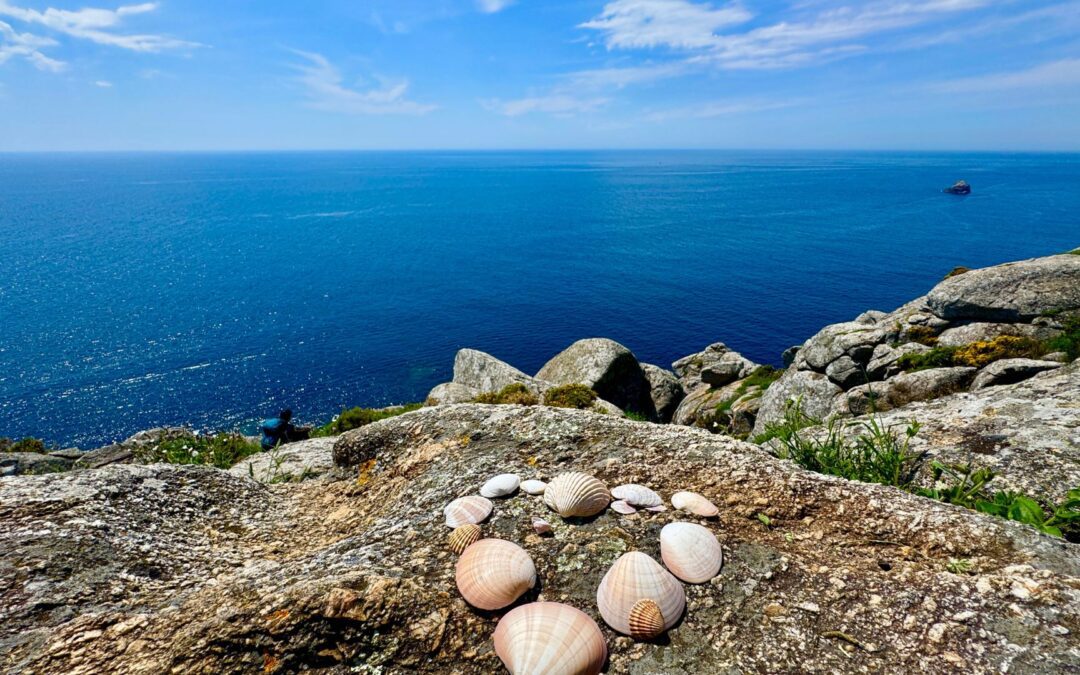People say it often on the Camino de Santiago: “The Camino will provide.”
I didn’t believe it at first. But the farther I walked, the more I felt its truth. It’s not miracle—it’s trust and wisdom. The trail meets you exactly where you are, often when you need it most.
A stranger when you’re lonely.
A café when you’re about to collapse.
A detour that turns out to be exactly where you needed to go.
A handwritten note left by a stranger that feels like it was meant for you.
A hug from someone you met just yesterday but already trust.
A moment of reflection you didn’t know you needed.
As a coach, I spend my days supporting others—holding space, asking questions, helping people reconnect with themselves. It’s work I love, and it’s work that asks a lot. Somewhere in the rhythm of listening to others, I needed to listen to my own inner voice.
So I stepped away. Put on my boots. I showed up to the trail with a backpack and an open mind. What began as a walk across Galicia, Spain quickly became something else. The Camino—with its dirt paths and wide skies—gave me what I hadn’t even known I was craving. Walk. Eat. Connect. Rest. Repeat. In that simplicity, everything started to shift.
“Buen Camino” became more than a greeting. It meant: I see you. Keep going. You’re not alone. And “Ultreia”—the ancient word for onward—a reminder that the path continues, even when we don’t know exactly where it leads.
The path gives you what you need. And here’s what it reflected back:
I ditched my plan.
My itinerary was gone by day two. Getting lost led me to a small church with candles still flickering. Skipping a town meant crossing paths with someone I needed to meet. Letting go gave the Camino room to work.
I slowed down.
At first, I pushed—fast miles, full days, driven by habit. But eventually my body, and then my spirit, asked me to slow. And when I did, I started to notice—the chirping of the birds, the sound of gravel underfoot, the color of the flowers, the thoughts I’d been avoiding.
I carried too much.
Physically and emotionally. My pack was overstuffed with “just-in-case” items. So was my mind. With each mile, I let go of something—an umbrella I never used, an unnecessary worry, a story I didn’t need anymore. Lightness became a choice.
I was changed by strangers.
There was Isabel, a Spanish mother walking with her 8-year-old daughter, just six months after losing her husband in a car crash. She carried her grief quietly, focusing on every step forward—for both of them.
Dev, from Singapore, had major back surgery a few months earlier. He’d once been unable to walk more than ten steps—yet here he was, steady and determined, his every mile a quiet miracle.
Ale and Ana, two sisters from Mexico, were marking the anniversary of their father’s passing. In walking together, they were not only honoring him—but also discovering deeper meaning and purpose in their own lives.
Matteo, a young Italian with an infectious laugh, became the soul of every pilgrim stop. Beneath the lightness, he was reflecting deeply on what it meant to live la dolce vita with purpose—not just delight.
Rachel, a former tech exec taking time to travel after a major life reset, brought an energy that lifted everyone around her. She showed up with bright blue eyes, an easy laugh, and a gift for making strangers feel like old friends.
Kevin and Jack, an Irish father and son, made every hill a reason to laugh. Beneath the jokes, they were simply two people carving out time to reconnect, away from the noise of everyday life.
Pete, a recent widower, had walked the Camino years ago with his wife. This time, he returned to scatter her ashes in Finisterre. Frail and walking with an injured leg, he had taken the bus, determined to honor her memory in the places she had loved most.
And then there were the dozens more:
A woman walking to mark her recovery from cancer.
A man walking to remember his brother.
Siblings reconnecting.
Strangers turning into soul-friends by the second day.
I kept going.
Even on the hard days. Even when it rained or I didn’t feel like it. One foot. Then another. It wasn’t dramatic. It was steady. Healing often looks like that: quiet consistency, not sudden breakthroughs. Padem padem—step by step.
I arrived different.
Not drastically, but deeply. Something subtle had shifted. I felt more open, more grounded, more aware of what matters. The Camino didn’t hand me clarity—it reminded me how to listen. What I carried home weren’t answers, but invitations—to stay curious, to slow down, to trust what unfolds.
Everyone walks their own Camino.
Some seek religious meaning. Some deeper clarity. Some adventure and nature. Some carry their pack. Some send it ahead. Some walk 100 kilometers, others 800. None of it makes your Camino more or less real or special. What matters is that it’s yours.
The Camino isn’t about how fast you move. It’s about how gently you treat yourself when things don’t go as planned. How willing you are to be changed by what you didn’t expect.
Because the way we walk is the way we live.
I walked all the way to the ocean—Finisterre, the end of the world—and somewhere along the way, I came home to something steady within me. Not new. Just remembered.
The Camino is a generous teacher.
And maybe its most powerful lesson is this:
Keep going. You are already home.
Coaching Can Be Your Companion
The way we walk is the way we live.
If you’re feeling the pull to slow down, re-center, or reimagine what’s next, coaching can offer a steady companion along the way.

